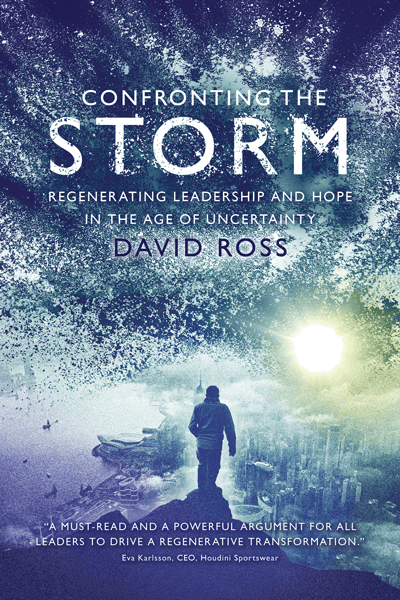By David Ross
In the face of interconnected challenges and opportunities, leadership is in crisis. Our centuries-old leadership styles are failing, unable to adapt to the frenetic speed of change. Instead, we need a society embedded with leaders who are more collective and holistic in their thinking and behaviour.
If not now, when?
“The difficulty lies not in the new ideas, but in escaping from the old ones.” – John Maynard Keynes
A few years ago, I came across the most fascinating article. It was in a business magazine from the late 1990s or early 2000s. The article, horrifyingly, anticipated that a significant vacuum in corporate leadership capability was about to appear. It claimed that the previous generation of “titans of industry” had not focused on succession. Instead, it was implied that with a “great leader” mentality, this outgoing generation had remained focused on ensuring that their singular vision for their organisations continued to be delivered. That was the extent of their legacy.
Concerns about a dearth of leadership were seen then and can still be seen today. Subsequently, organisations are now suffering. There is a crisis in organisational trust. There is little progress in resolving the big picture challenges we face. Plus, the world’s plant and animal species aren’t the only ones facing a wave of extinction. Indeed, research by WatchMyCompetitor has indicated that, of the companies listed on the Fortune 500 in 2003, more than half (52%) no longer exist.
This has all happened within the space of just 20 years and it will only get worse.
What we are seeing today, however, I would argue is not solely a direct correlation to the legacy left by the Millenium retirees. Even if the Jack Welch’s of the world had paid attention to strategic succession planning, I believe there would have still been seismic structural concerns facilitated by the 20th Century leadership thinking still prevalent today.
Normal Has Left the Building
In some ways, Western society revolves around a mindset of certainty, that our corporations or government agencies, broadly speaking, function within certainty. Yes, there are some upheavals, some “corrections.” But generally, the linear style thinking and problem-solving culture within our organisations facilitated the story of “the great leader,” who was responsible for controlling the destiny of their organisations, divisions, teams and us.
This is patently an illusion. It has arguably been an illusion for many decades.
The term “wicked problems” was coined in the 1970s, recognising problems that had more than one root cause and that they, themselves, were root causes of other wicked problems like climate change, crime, poverty and sustainability. “The great leaders” have made no progress on these interconnected challenges – and opportunities.
In the mid-1980s, the Brundtland Report was published in response to the UN General Assembly calling for a “global agenda for change”, ensuring that future global development met the needs of “the present without compromising the ability of future generations to meet their own needs.” The Report stated that institutions had to evolve if these interconnected wicked problems were to be successfully confronted. More holistic thinking was necessary, greater urgency was required. Chillingly, “Attempts to maintain social and ecological stability through old approaches to development and environmental protection will increase stability.”
That was almost forty years ago.
Terms like permacrisis or polycrisis now have greater visibility in describing the instability that we now face and was anticipated, decades ago. It is not something that just affects others “over there.”
The speed of change is increasingly frenetic. Technological advancement feels exponential in scale. Stakeholders, external and internal, are increasingly partisan and demanding in what they expect from organisations. Climate change bites harder, resulting in extreme weather events that hamper the certainty of supply chains. Conflict, regional and local, abounds.
Organisations like yours are, subsequently, becoming brittle. The recent results from PwC’s Annual Global CEO Survey reflect this, indicating that increasing leaders anticipate that their organisations won’t be viable within ten years if they continue on their current paths. Nevertheless, even with fear of what may lie ahead, we are still led by thinking and leadership styles from the 20th Century and from the get-go of the Industrial Revolution. There is no adaptation, only unquestioning adherence to the centuries-old stories.
We continue to do little more than push leadersh#t up hill.
What Got Leaders to Here Won’t Get Them to There
Today, we need leaders who realise that in the face of such seismic change, the skills and mindsets that may have served them well are now a formidable obstacle to success, collectively and personally. They must adapt, not remain rigid.
We need leaders who see non-market forces as having as much weight, strategically, as market forces. Non-market forces that do not stop outside organisations’ comfort zones. Existential forces like climate change and AI; environmental forces like raw material scarcity and product waste; social forces like stakeholders becoming more coordinated and sophisticated and who see through organisational spin.
We need leaders who transcend the egocentric to be externally-centric, accepting that they no longer have the expertise or time to be able to make sense of their context, make all the necessary decisions, nor find innovative solutions to what we face on their own.
Instead, we need leaders who appreciate that, for their organisations to thrive, they must be more collaborative. That entails nourishing leadership throughout organisations, allowing for more teams to determine how an organisation’s vision and strategy will be delivered in the changing context faced.
This means we need leaders who are emotionally intelligent and comfortable with being vulnerable in the knowledge that they don’t know everything. They need to be mindful of how they impact upon others and how others impact upon themselves.
Ultimately, this means that we need leaders who are better prepared for what is emerging and consequently are mindful of how our present and future behaviours and thinking can be anchored and stifled by the past.
We need bold, courageous leaders – like you.
About the Author

 David Ross is an international VUCA strategist, organisational peacemaker and founder of Phoenix Strategic Management. David works with organisations to prepare them for ever-increasing global shocks or when crisis strikes. David is also author of Confronting the Storm: Regenerating Leadership and Hope in the Age of Uncertainty.
David Ross is an international VUCA strategist, organisational peacemaker and founder of Phoenix Strategic Management. David works with organisations to prepare them for ever-increasing global shocks or when crisis strikes. David is also author of Confronting the Storm: Regenerating Leadership and Hope in the Age of Uncertainty.




































































